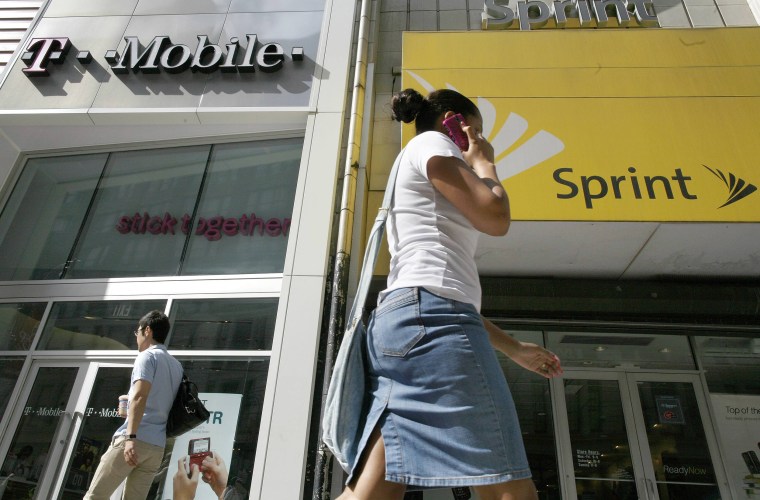The head of the U.S. government's wireless regulator is giving the green light to T-Mobile's $26 billion acquisition of Sprint, a deal that will combine the country's third- and fourth-biggest wireless carriers — with some caveats.
The deal, which had been opposed by some consumer advocates who said it would mean reduced competition and higher prices, is contingent on the two companies agreeing to stipulations on the development of next-generation 5G technology and the expansion of broadband internet access to rural areas, according to a statement released Monday by the Federal Communications Commission.
“Two of the FCC’s top priorities are closing the digital divide in rural America and advancing United States leadership in 5G, the next generation of wireless connectivity," FCC Chairman Ajit Pai said in a press release. "The commitments made today by T-Mobile and Sprint would substantially advance each of these critical objectives."
T-Mobile first agreed to acquire Sprint for $26 billion in April 2018, but the deal remained in doubt due to regulatory scrutiny. The FCC has previously blocked some mergers in the wireless industry.
The deal still needs to make it through a vote at the FCC, as well as an ongoing review by the Justice Department.
Jessica Rosenworcel, one of two Democratic FCC commissioners, tweeted that she has "serious doubts" about the deal.
"We've seen this kind of consolidation in airlines and with drug companies. It hasn't worked out well for consumers," she said.
Pai, who was appointed to head the FCC by President Donald Trump, would need only the approval of the two other Republican commissioners to approve the deal.
Pai said the companies have committed to building a 5G network within three years of the deal's closing that would cover 97 percent of the U.S. population. That network would expand to 99 percent of the population within six years, and include 90 percent of rural areas.
“The construction of this network and the delivery of such high-speed wireless services to the vast majority of Americans would substantially benefit consumers and our country as a whole," Pai said.
The deal will also require the combined Sprint and T-Mobile to build an in-home broadband internet network, and also not to raise prices for three years. The companies will also sell off the Boost Mobile business.
"This sale is designed to address potential competitive issues that have been identified in the prepaid wireless segment," Pai said.
Pai said that if the companies do not meet the requirements of the deals, they will be subject to "billions of dollars" of fines.
Gigi Sohn, a former counselor to the FCC chairman in the Obama administration and currently a distinguished fellow at the Georgetown Law Institute for Technology Law & Policy, questioned whether the FCC would be able to make sure Sprint and T-Mobile live up to its promises.
"The companies have made a handful of promises on 5G, rural buildout and in-home broadband that are speculative, not specific to the merger and completely unenforceable," Sohn said in a statement. "Does anyone really believe that this FCC, which has asked nothing of the big mobile companies for over 2 years, will require the companies to abide by these commitments?"

